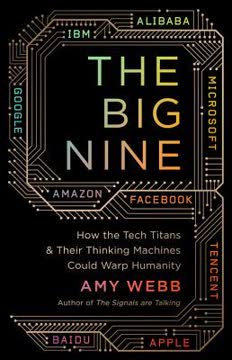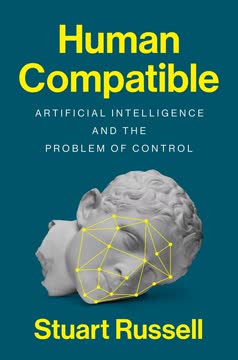Key Takeaways
1. Convergence of exponential technologies is reshaping our world at unprecedented speed
"We're going to experience twenty thousand years of technological change over the next one hundred years."
Accelerating change. The convergence of multiple exponential technologies, such as artificial intelligence, robotics, and biotechnology, is driving change at a pace never before seen in human history. This rapid acceleration is fundamentally altering every aspect of our lives, from how we work and communicate to how we learn and entertain ourselves.
Exponential growth. Unlike linear growth, which progresses steadily, exponential growth starts slowly but then rapidly accelerates. This pattern is evident in technologies like computing power, which has doubled roughly every two years (Moore's Law). As these technologies converge, their combined impact becomes even more profound, leading to breakthroughs that were once thought impossible.
Implications for society. The rapid pace of change presents both opportunities and challenges:
- Industries and job markets are being disrupted
- New solutions to global problems are emerging
- Traditional institutions and ways of thinking are being challenged
- Individuals and organizations must adapt quickly to remain relevant
2. AI and robotics are transforming industries, from retail to healthcare
"By 2030, when you're wheeled into the operating room and see a human doctor, your immediate response will be: 'No way. I want the robot.'"
Retail revolution. AI is reshaping the retail landscape by:
- Enabling personalized recommendations and dynamic pricing
- Powering cashier-less stores like Amazon Go
- Optimizing supply chains and inventory management
Healthcare transformation. In healthcare, AI and robotics are:
- Improving diagnostic accuracy and speed
- Assisting in complex surgeries with greater precision
- Developing personalized treatment plans based on genetic data
Ethical considerations. As AI and robotics become more prevalent, society must grapple with:
- Job displacement and the need for retraining
- Privacy concerns related to data collection and use
- The balance between human judgment and machine decision-making
3. Virtual and augmented reality are creating immersive experiences and new realities
"VR unlocks the possibility of an entirely different kind of moral education."
Immersive education. Virtual reality (VR) and augmented reality (AR) are revolutionizing education by:
- Allowing students to take virtual field trips to any place or time
- Providing hands-on experience in dangerous or inaccessible environments
- Enhancing empathy and understanding through immersive experiences
Entertainment evolution. In the entertainment industry, VR and AR are:
- Creating interactive and personalized storytelling experiences
- Blurring the lines between physical and digital worlds
- Enabling new forms of social interaction and collaboration
Real-world applications. Beyond education and entertainment, VR and AR are impacting:
- Healthcare (surgical training, therapy for phobias)
- Architecture and design (virtual prototyping)
- Retail (virtual try-ons, immersive product experiences)
4. 3D printing and nanotechnology are revolutionizing manufacturing and materials
"3D printing removes the need for inventory and everything that inventory demands."
On-demand manufacturing. 3D printing is transforming production by:
- Enabling customization at scale
- Reducing waste and inventory costs
- Allowing for rapid prototyping and iteration
Material innovation. Nanotechnology is pushing the boundaries of material science by:
- Creating stronger, lighter, and more durable materials
- Developing self-cleaning and self-repairing surfaces
- Enabling precise drug delivery systems
Industry impact. These technologies are disrupting multiple sectors:
- Healthcare (3D-printed organs, personalized implants)
- Construction (3D-printed houses, smart materials)
- Fashion (custom-fit clothing, smart textiles)
5. Blockchain and new financial models are disrupting traditional economic systems
"Blockchain removes the middleman from the exchange, instead validating transactions with every computer on the network."
Decentralized finance. Blockchain technology is enabling:
- Cryptocurrencies and digital assets
- Smart contracts that execute automatically
- Transparent and secure record-keeping
New economic models. Emerging financial systems include:
- Crowdfunding and initial coin offerings (ICOs)
- Peer-to-peer lending platforms
- Tokenization of real-world assets
Societal implications. These changes are leading to:
- Increased financial inclusion for the unbanked
- Challenges to traditional banking and regulatory systems
- New forms of value creation and exchange
6. Biotechnology advances are extending human lifespans and capabilities
"We're not long from the day when most of your real estate search—home, apartment, office, whatever—will be conducted from your couch, via a VR headset, with the help of your personal AI."
Genetic engineering. CRISPR and other gene-editing technologies are:
- Treating genetic diseases
- Enhancing crop yields and resilience
- Raising ethical questions about human enhancement
Longevity research. Scientists are working on:
- Slowing or reversing the aging process
- Regenerative medicine and tissue engineering
- Personalized medicine based on individual genetic profiles
Human augmentation. Emerging technologies are:
- Enhancing physical capabilities through exoskeletons and prosthetics
- Improving cognitive function through brain-computer interfaces
- Blurring the line between human and machine
7. The future of transportation includes flying cars, hyperloops, and space travel
"By 2030, going on vacation might have a totally different meaning. Going to work most definitely will."
Urban air mobility. Flying cars and autonomous aerial vehicles are:
- Reducing traffic congestion in cities
- Enabling faster and more flexible transportation
- Presenting new challenges for air traffic control and regulation
High-speed ground transport. Hyperloop and similar technologies promise:
- Drastically reduced travel times between cities
- Lower environmental impact compared to traditional transportation
- New economic opportunities through connected urban centers
Space exploration. Private companies are driving:
- Reusable rocket technology for cheaper space access
- Plans for Mars colonization and asteroid mining
- Space tourism and orbital manufacturing
8. Climate change and resource scarcity pose existential risks, but solutions are emerging
"We have just twelve years to fix this problem. Either limit global warming to 1.5 degrees or face catastrophic consequences."
Renewable energy. Advancements in clean energy include:
- Dramatic cost reductions in solar and wind power
- Improved energy storage technologies
- Smart grids for efficient energy distribution
Sustainable agriculture. Innovations are addressing food security through:
- Vertical farming and urban agriculture
- Lab-grown meat and plant-based alternatives
- Precision agriculture using AI and IoT
Environmental restoration. Technologies are being developed for:
- Large-scale carbon capture and sequestration
- Ocean cleanup and plastic waste reduction
- Reforestation and biodiversity preservation
9. Education and entertainment are becoming more personalized and accessible
"VR lets us create distributed, customized, accelerated learning environments."
Adaptive learning. AI-powered educational platforms are:
- Tailoring content to individual learning styles and paces
- Providing real-time feedback and assessment
- Enabling lifelong learning and skill development
Immersive entertainment. New technologies are creating:
- Interactive and participatory storytelling experiences
- Personalized content recommendations
- Blended physical and digital entertainment environments
Democratized creativity. Tools and platforms are:
- Enabling anyone to become a content creator
- Facilitating global collaboration and knowledge sharing
- Challenging traditional gatekeepers in media and education
10. New business models and the democratization of technology are creating opportunities
"Every time a technology goes exponential, we find an internet-sized opportunity tucked inside."
Platform economies. Digital platforms are:
- Connecting buyers and sellers directly
- Enabling the sharing economy (e.g., Airbnb, Uber)
- Creating new marketplaces for goods and services
Democratized innovation. Open-source technologies and crowdfunding are:
- Lowering barriers to entry for entrepreneurs
- Accelerating the pace of innovation
- Enabling global collaboration on complex problems
Shifting value chains. Traditional industries are being disrupted by:
- Direct-to-consumer business models
- Subscription and on-demand services
- Blockchain-enabled decentralized organizations
Last updated:
FAQ
What's The Future Is Faster Than You Think about?
- Converging Technologies: The book explores how technologies like AI, robotics, and biotechnology are converging to transform industries and everyday life. This convergence leads to exponential growth and significant societal impacts.
- Innovation and Opportunities: Authors Peter H. Diamandis and Steven Kotler discuss how these technologies can solve global challenges, democratize resources, and create new business opportunities.
- Real-World Examples: It includes case studies, such as Uber's flying cars and healthcare advancements, to illustrate the potential of these technologies, making the concepts relatable and grounded in current developments.
Why should I read The Future Is Faster Than You Think?
- Understanding Future Trends: The book helps readers grasp rapid technological changes and their effects on life aspects like transportation and healthcare, preparing them for the future.
- Inspiration for Innovators: It serves as a motivational guide for entrepreneurs, offering insights into leveraging technologies for business success and encouraging big thinking.
- Comprehensive Overview: The book provides a thorough examination of technology interplay, making it valuable for those interested in technology, business, or societal change.
What are the key takeaways of The Future Is Faster Than You Think?
- Convergence is Key: The convergence of multiple technologies will lead to unprecedented societal changes, accelerating innovation and disrupting industries.
- Exponential Growth: Technological advancements occur at an accelerating pace, leading to rapid changes in capabilities and costs, exemplified by Moore's Law.
- Opportunities for Entrepreneurs: Immense opportunities exist for entrepreneurs to create solutions to global challenges using converging technologies, with a roadmap provided for navigating this landscape.
What are the best quotes from The Future Is Faster Than You Think and what do they mean?
- "The heart of this book...": This quote emphasizes understanding how different technologies converge to create significant change, encapsulating the book's central theme.
- "We’re heading toward a world...": Reflects the vision of a future where technology enhances human capabilities and connectivity, leading to a more integrated society.
- "Every major industry on our planet...": Highlights the disruptive potential of converging technologies, suggesting fundamental alterations in traditional business models and practices.
How do the authors define "convergence" in The Future Is Faster Than You Think?
- Definition of Convergence: Convergence is the overlapping of independent lines of accelerating technology, creating new possibilities and innovations, amplifying each technology's impact.
- Impact on Industries: It drives industry transformation, leading to new business models and opportunities, crucial for innovation or adaptation.
- Examples of Convergence: Technologies like AI, robotics, and 3D printing converge to create solutions in fields such as healthcare and transportation, illustrating practical implications.
What role does AI play in the future as described in The Future Is Faster Than You Think?
- AI as a Catalyst: AI is a key driver of change, enabling faster data processing, improved decision-making, and automation across sectors, enhancing human capabilities.
- Integration with Other Technologies: AI converges with technologies like robotics and sensors to create smarter systems, revolutionizing industries like healthcare and transportation.
- Personalization and User Experience: AI personalizes user experiences, from shopping recommendations to healthcare solutions, marking a major future trend.
How does The Future Is Faster Than You Think address the future of healthcare?
- Transformative Technologies: AI, genomics, and 3D printing are set to revolutionize healthcare delivery and outcomes, leading to more personalized and efficient care.
- Shift from Sick Care to Healthcare: Advocates for proactive healthcare, where technology enables early detection and prevention, improving health and longevity.
- Case Studies and Innovations: Examples of telemedicine and wearable health monitors illustrate the potential for a healthier future.
What is the significance of "longevity escape velocity" in The Future Is Faster Than You Think?
- Definition of Longevity Escape Velocity: Refers to advancements allowing lifespan extension by more than one year for every year lived, suggesting aging management or reversal.
- Implications for Society: Would profoundly impact workforce dynamics, healthcare costs, and social structures, leading to a more productive population.
- Current Progress: Discusses ongoing research in gene therapy and regenerative medicine moving us closer to this goal, highlighting potential health and lifespan advancements.
How do the authors envision the future of transportation in The Future Is Faster Than You Think?
- Emergence of Autonomous Vehicles: Predicts a future with autonomous vehicles transforming urban mobility and reducing accidents, changing car ownership and transportation.
- Flying Cars and Hyperloop: Discusses potential for flying cars and high-speed systems like Hyperloop to revolutionize travel, making commuting faster and more efficient.
- Integration with Smart Cities: Tied to smart city development, optimizing traffic flow and reducing congestion, enhancing urban experience and quality of life.
How do converging technologies impact the future of finance in The Future Is Faster Than You Think?
- Fintech Revolution: Fintech is transforming banking by integrating technologies like blockchain and AI, making financial services more accessible and efficient.
- Decentralization of Finance: Blockchain decentralizes transactions, reducing intermediaries, lowering costs, and increasing transparency.
- Rise of Crowdsourcing: Crowdsourced solutions like peer-to-peer lending and crowdfunding empower individuals and businesses to access capital more easily.
How does The Future Is Faster Than You Think address the concept of technological unemployment?
- Job Displacement vs. Job Creation: While automation may displace jobs, it also creates opportunities in emerging fields, with historical examples of job transformation.
- Need for Workforce Retraining: Emphasizes retraining to adapt to new technologies, mitigating technological unemployment effects.
- Collaboration Between Humans and Machines: Future involves human-machine collaboration, enhancing productivity and creating new roles.
How does The Future Is Faster Than You Think suggest we prepare for the changes ahead?
- Embrace Lifelong Learning: Advocates continuous learning and adaptability to stay informed about technological advancements and implications.
- Foster Innovation and Entrepreneurship: Encourages pursuing entrepreneurial ventures and innovative solutions to global challenges using converging technologies.
- Engage in Dialogue and Collaboration: Stresses collaboration across sectors to address challenges and opportunities, with open dialogue essential for shaping a positive future.
Review Summary
The Future Is Faster Than You Think presents an optimistic view of technological advancements across various industries. Readers appreciate the book's comprehensive overview of emerging technologies but criticize its overly enthusiastic tone and lack of depth. Some find it informative and inspiring, while others consider it superficial and outdated. The book's focus on Silicon Valley and its short-term predictions are points of contention. Despite mixed reviews, many readers found value in learning about potential future innovations, though some question the feasibility and timeline of the proposed changes.
Similar Books










Download PDF
Download EPUB
.epub digital book format is ideal for reading ebooks on phones, tablets, and e-readers.






